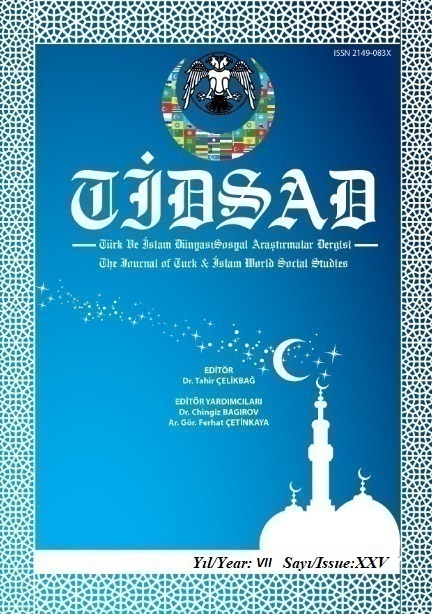Author :
Abstract
Batılı ülkeler Doğulu toplumlardan önce rasyonelleşmeyi ve sanayileşmeyi başarmışlardır. 18. yüzyıldan itibaren Doğulu toplumlar kültürel olarak Batılı toplumlardan daha geride olduklarını kabullenmişlerdir. 19. yüzyılın sonlarında Japonya, Türkiye, Rusya gibi Doğulu ülkeler Batılı modeller bağlamında modernleşmeye ve kalkınmaya çalışmışlardır. Doğulu ülkelerin Batıdan aldığı modellerin başında İngiliz modeli ve Klasik Okulun düşünceleri bulunuyordu. Almanya merkezli Tarihçi Okulun görüşleri ise ikinci planda kalıyordu. Alman Tarihçi Okulunun devamı olarak ortaya çıkan iktisat sosyolojisi ekonomi biliminin önemli bir alanı olmuştur. İktisat sosyolojisi yaklaşımına göre kültür önemli bir değişkendir, iktisadi davranışları ve modelleri etkiler. Amerikan toplumu Protestan kültürüyle sanayi devrimi yapabilmiş ve küresel bir güç olabilmiştir. Japonya 1950’lerden sonra Asya kültürü ve değer sistemiyle kalkınmayı başarmıştır. Bu bağlamda çalışmada, Amerikan ve Japon toplumlarında kültür, modernleşme ve ekonomi bilimi arasındaki ilişki kısaca anlatılmaktadır
Keywords
Abstract
Western countries realized rationalization and industrialization before Eastern societies. From 18th century onwards, Eastern societies have acknowledged that they are culturally lower than Western societies. In the late 19th century Eastern countries like Japan, Turkey and Russia have tried to modernize and develop in the context of Western models. The British model and the thoughts of the Classical School were at the top of the models taken by the Eastern countries from the West. The views of the German Historical School remained second. The economic sociology which emerged as a continuation of the German Historical School, has been an important field of economics. According to the approach of economic sociology , culture is an important variable which affects economic behaviors and models. The American society was able to make an industrial revolution with the Protestant culture and became a global power. After World War II, Japan succeeded to develop with Asian culture and value system. In this study, the relationship between culture, modernization and economics is briefly explained by referencing American and Japanese societies.
Keywords
- Barber, William J. (2003), “American Economics to 1900”, Edisyon: Samuels Warren J. ; Biddle, Jeff E. ; Davis John B. , A Companion to the History of Economic Thought, Blackwell Publishing
- Frey, Donald E. (2009), America’s Economic Moralists: A History of Rival Ethics and Economics, State University of New York Press
- Macfarlane, Alan (2002), The Making of the Modern World, Palgrave
- Morris-Suzuki, Tessa (1989), A History of Japanese Economic Thought, Routledge
- Nishizawa, Tamotsu (2001), “Lujo Brentano, Alfred Marshall, and Tokuzo Fukuda: The Reception and Transformation of the German Historical School in Japan”, Edisyon: The German Historical School, Routledge
- Skousen, Mark (2001), The Making of Modern Economics, M.E. Sharpe
- Sugiyama, Chuhei (1994), Origins of Economic Thought in Modern Japan, Routledge
- Yamawaki, Naoshi (1993), “Hermeneutics of Culture and the Universality of Ethics: Beyond the Formalism and Culturalism of Economic Philosophy and Social Ethics”, Edisyon: The Good and The Economical, Springer-Verlag





